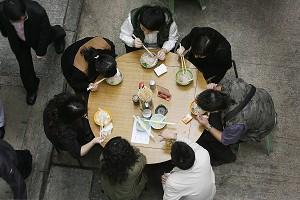Chinese media have recently reported on the astonishing extent of corruption by village officials. Some village officials have embezzled over 10 million yuan (US$1.63 million) and many have personal assets worth 100 million yuan (US$16.3 million).
In mainland China, village officials are the lowest level in the administrative system. However, their level of corruption is not low.
One village official from Guangzhou City has personal assets of over one billion yuan (US$163 million). His family have emigrated to Canada.
Another village official from Tangxi Village, Baiyun District in Guangzhou City received bribes of 6.47 million yuan (US$ 1.06 million) from one construction project alone.
According to China’s ‘Honesty Outlook’ magazine, the secretary of CCP’s Disciplinary Committee in Guangzhou recently confronted village officials, “They seized over three million and still don’t know he’s taking bribes. Do they not understand the law, or they are pretending to be ignorant?”
Disciplinary officials say that as village officials are not civil servants, bribery charges don’t apply to them. Their crimes can only fall under property embezzlement.
Yet many village officials are entrepreneurs themselves. It can be hard to discern which properties are rightfully theirs, and which ones were obtained illegally.
Mr. Huang, a state employee from Guangzhou, told Radio Free Asia that as the economy of the Pearl Delta is thriving, with a high gross domestic product, village officials are using the collectively-owned land to make a fortune.
“If it is not selling the land, it will be constructing factory buildings as a joint venture and renting them out to make money. These are the essential methods for these officials to make money,” said Huang.
Chinese media’s report said that usually a few village officials can decide how much to rent the industrial buildings built on the collectively-owned land. In the process, there are many grey zones.
Mr. Huang gave an example. The land in ChengbianVillage in Guangzhou City was owned by all the farmers. The value of building a mansion on that land can be worth tens of millions or even 100 million.
During the process of developing the land, the CCP village secretary makes a decision on the finances, and no one can monitor that. The right of supervision by villagers mentioned in Village Committee Organization Law, which is promulgated in China, has no restraining mechanism for the conduct of the CCP village secretary.
“Supervisions by the villagers? I have never seen a mechanism for supervision. Everything is decided by the CCP village secretary. It has always been like this,” said Huang.
Corruption of village officials not only exists in Guangdong, but also is very common in different regions in China.
According to Chinese media’s reports, Liu Huimin, secretary of Qili Village, Quyang County, Baoding City of Hebei Province was sentenced to death for multiple instances of bribery involving 55 million yuan (US$8.99 million).
Another report by People’s net revealed that, in a malfeasance case in Sanmenxia City, Henan Province, half of the people involved in the cases are village officials and CCP secretaries of the village.
In Wenzhou City, Zhejiang province, ten village officials divided the local real estate fund of 180 million yuan (US$29 million) among themselves, leaving the public in shock.
The CCP regime has been claiming for the past 20 years it is establishing democratic elections for the village committee, yet the actual effect is very limited.
Xie Tian, professor in management in South Carolina State University said that based on his analysis of crimes committed by China’s village officials, many more financial crimes were committed by the CCP village secretary than by the village directors.
On the one hand, this reflects the characteristics of China’s one-party dictatorship. On the other hand, it also reflects how the CCP has not truly promoted self-government in the villages.
Villagers can elect the directors of the village but cannot elect the CCP village secretary. Xie believes that under the one-party dictatorship, village officials’ corruption, bribery, and abuse of power are a problem of the system, and not unexpected.
Written in English by Christine Ford.
Copyright © 1998-2013, RFA. Used with the permission of Radio Free Asia




